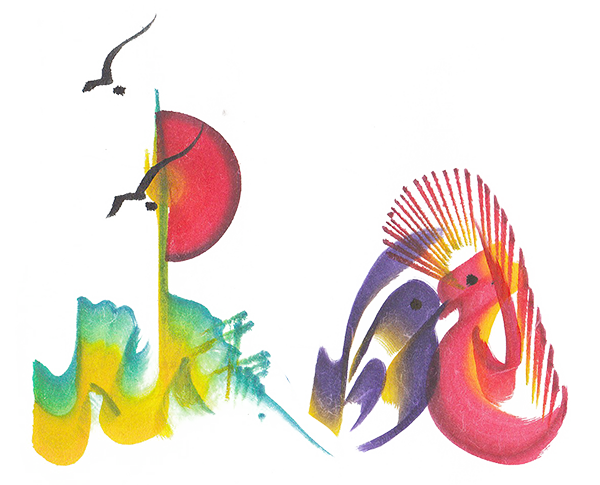SEE HERE : WITH A LITTLE HELP FROM MY FRIENDS
I worked with a girl once for whom English was a (near-perfect) second language. One of my favourite things about her lexicon was her use of the word “sad”, which I almost never use. It always seems too easy and too small a word, but the more probable reason is that my own lexicon is so overwrought with hyperbole that “sad” never seems enough.
After watching Andrew Dominik’s new film about Nick Cave’s latest album, Skeleton Tree, I realised that “sad” is just the word to describe Cave, his wife Susie, and their friends in the wake of Cave’s son Arthur’s death. The film was made in lieu of a promotional tour, to spare Cave the agony of interviews. The film shows a Cave bereft of swagger, rendered banal and familiar by this chance tragedy.
Like many other Cave fans around the world, I eagerly stood clutching my ticket to One More Time With Feeling on 8 September. I have, like everyone else, been listening to Skeleton Tree on heavy rotation ever since, picking favourites, picking new favourites. I have read many reviews of the film, and nodded in agreement with most of them (this one by Amanda Palmer of the Dresden Dolls is a particularly perceptive and moving meditation on what it is to be an artist grieving, and what that looks like).
The articles mostly talk about what an emotional gut-punch the film is - and it is - but not in the same way as Cave’s music is a gut-punch. Cave’s lyrics and drawl always manage to tell explicit stories and colour in the atmosphere at the same time - they fill the room, the world, that they are played in. The most horrible thing about the film is how Cave, at least in the interviews (the lyrics are another matter), has no new ways of talking about his “trauma”, as he puts it. He uses the same words as I would. That is a terrible thing indeed.
Cave says he would very much like to imagine that his son is still with him, in everything that he does, “But he’s not.” The poetics and metaphors don’t extend to this new situation. He talks about Arthur’s death as something that they have to deal with, but then speaks of his son as an adult, as though he is giving him his due: “It happened to us, but it happened to him.”
But the thing that struck me most about the film was that for the first time, rather than being transfixed by Cave’s own magnetic face, I found myself looking where he looked - following his eyes as they rested on the faces of the ones he still has. There is so much Susie in the film, so much Warren. “Look at him,” Cave coos at Ellis, after an amusing exchange about Cave’s hair looking great, “keeping everything together.” He is trying not to be selfish, trying not to lose himself, even when it comes to dudebros consoling him in the supermarket: “Remember to be kind to the director,” Cave’s voice-over monotones, “Remember to be kind.” Nick Cave, vocal hero of the Murder Ballads, remembering to be kind. Nick Cave, grieving.
Likewise, in a supremely painful sequence wherein Susie Cave talks about a drawing Arthur had done as a small child (creepily depicting the windmill atop the cliff from which he fell to his death), Cave sits gently wincing. He can’t help her in the same way nobody can really help him. Grief is terrible like that, and it’s no different here. In the opening scene, after Cave looks in a mirror, does his hair, puts on his jacket and then his coat, Dominik’s voice is heard asking Cave to run through the whole spiel again. That is what grief is like - someone nagging you to get up, get dressed, do it again, do it again.
But what Cave does do, luckily for us, is continue writing songs. Amanda Palmer touches on this in her essay above when she describes the responsibility of artists dealing with grief: “We frame our trauma as best we can, and we offer it up. At best, it’s a gift; at worst, it’s a product.” Cave, it is clear, is not on autopilot. By his own admission, the album is not as polished as it may have once been, but it is shot through with steely sprays of what can only really be described in my own dreary words as really articulate sadness.
Ignoring for a moment the vast disparity in scale, what comes to mind is Elie Wiesel’s description of the weakness of language in bearing witness to the Holocaust, from the preface to Night: “I had many things to say, I did not have the words to say them. Painfully aware of my limitations, I watched helplessly and language became an obstacle. [...] It still was not right. But what exactly was “it”? “It” was something elusive, darkly shrouded for fear of being usurped, profaned. All the dictionary had to offer seemed meager, pale, lifeless.”
Wiesel is talking about the deaths of millions, but I imagine when you’ve lost a young child your sense of perspective warps somewhat. At least that’s what I imagine of this entirely unimaginable situation. But what Cave does say, defiantly over the closing credits, is that he - they - have decided to be happy. Happy is the opposite of sad - the only thing for it, really. And when he says it, it’s far from glib. Rather, it’s an aspiration and a coping mechanism; a mantra. And it is enough.
After a one-night premiere, One More Time With Feeling will return to theatres for a proper run from 1 December.
SEE HERE is a monthly musing on a single artwork from anywhere, written by Amy Stewart: @A_L_STEWED // ASTEWARTWRITING.COM.
